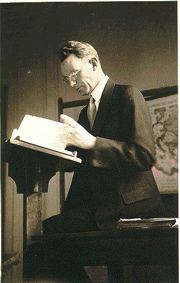Van Til's ApologeticNovember 18, 2012
Westminster Chief Administrative Officer, Steven J. Carter, continues his updates on life at the Seminary. This is the first in a series on what makes Westminster distinct. Apologetics is the academic discipline concerned with the defense of the Christian faith. It was taught by Dr. Cornelius Van Til from Westminster’s founding in 1929 until his retirement in 1972. Dr. Van Til’s teaching has had a profound effect on Westminster’s entire curriculum. For what can be known about God is plain to them, because God has shown it to them. (Romans 1:19) Before I ever got to Westminster, a friend introduced me to Cornelius Van Til’s approach to apologetics. He told me about a booklet called Why I Believe in God (available at Westminster Bookstore). “Get ready for a surprising punch line,” my friend said. “You’re expecting some brilliant argument and instead all you get, when it comes down to it, is this: ‘I believe in God because I’m a Dutchman!’” So I read the booklet. In it, Van Til carries on an extended conversation about why he’s a Christian. Although I could see my friend’s point, I wouldn’t say it was the best way to sum up Why I Believe in God. Rather, I see three big ideas. First, acknowledge the presuppositions. The business of believing because he’s a Dutchman came from Van Til’s conceding that he was brought up to believe. This opens the door to make the corresponding point that his unbelieving friend was brought up not to believe. It appears that you were as thoroughly conditioned not to believe in God as I was to believe in God. So let us not call each other names. If you want to say that belief was poured down my throat, I can always retort that unbelief was poured down your throat. (4) There’s no neutrality when it comes to the question of God. Everybody comes to the question with presuppositions; what we can call a mind already made up. So let’s put our presuppositions on the table and ask our unbelieving friend do the same. In the conversation, we may have the chance to help our friend identify some presuppositions he never knew he had. Second, recognize the fatal flaw in traditional apologetics. Van Til argues that while trying to defend the faith, Christians have unwittingly denied it: Noting the fact that men do not see, we have conceded that what they ought to see is hard to see. In our great concern to win men we have allowed that the evidence for God’s existence is only probably compelling. And from that fatal confession we have gone one step further down to the point where we have admitted or virtually admitted that it is not really compelling at all. (12) So if I sit down with my unbelieving friend and present an extended argument for God’s existence, as though only if he can follow the argument with an open mind will what is shrouded in fog finally begin to clear up, I have denied the claim of Romans 1 that God has clearly revealed Himself. I have unwittingly presented a different god; one that is unable to reveal himself to my friend or to anyone else. Third, present the truth about man and his need for Christ. Van Til calls us to be faithful to the Word, even if it causes offense. A vital theme is that people suppress the clear knowledge of God and need a gracious work of the Holy Spirit before they can see clearly again: And if I have not offended you I have not spoken of my God. For what you have really done in your handling of the evidence for belief in God is to set yourself up as God. You have made the reach of your intellect the standard of what is possible or not possible. You have thereby virtually determined that you intend never to meet a fact that points to God. (13) You have cemented your colored glasses to your face so firmly that you cannot take them off even when you sleep...Only the great Physician through His blood atonement on the cross and by the gift of His Spirit can take those colored glasses off and make you see facts as they are, facts as evidence, as inherently compelling evidence, for the existence of God. (14) Those big ideas are rooted in the gospel. We need them to touch our hearts as well as to inform our minds. When they do, we will gain boldness in defending the faith: I hold that belief in God is not merely as reasonable as other belief; it is not a little more probable, or infinitely more probable, than unbelief. I hold rather that unless you believe in God you can logically believe in nothing else. (16) We also need to grow in grace, following Van Til’s winsome example as he talks to a friend about Christ with humor, good will and genuine affection: So now I shall leave you with Him, and with His mercy. (16)
|







 To support Westminster's mission
To support Westminster's mission